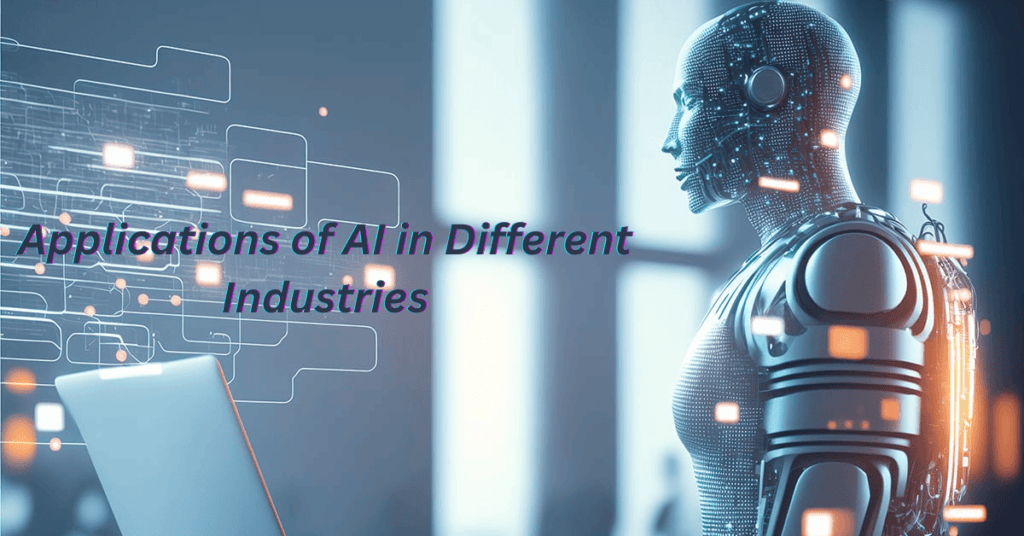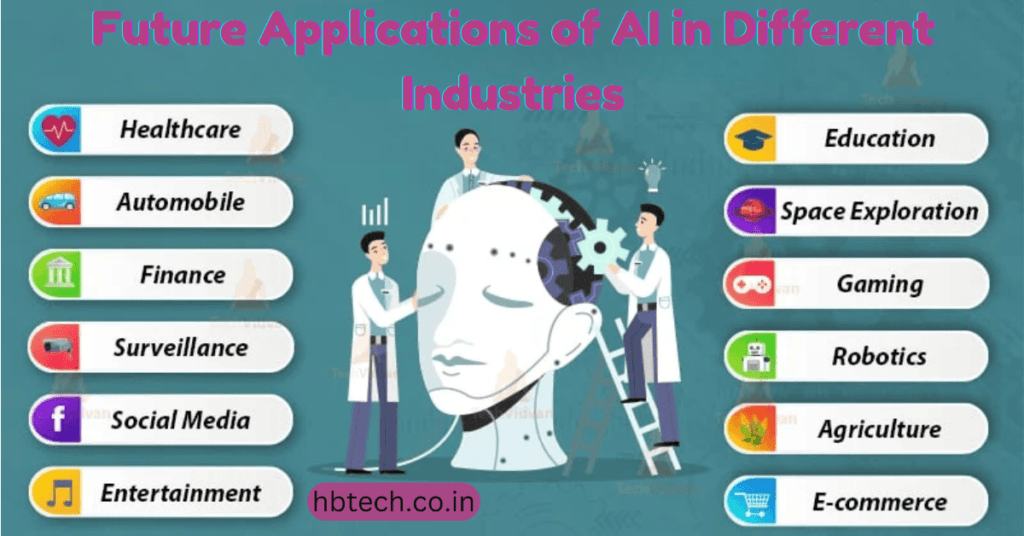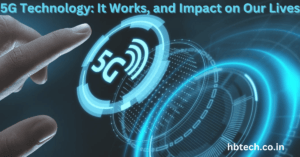Artificial Intelligence (AI) is changing the way we live and work, with its impact being felt across many industries. As AI continues to evolve, its future applications promise to bring even more exciting changes.

Healthcare
AI has the potential to completely transform healthcare, making it more efficient and personalized. Here are some future uses of AI in this field :
- Tailored Treatments: AI can analyze a patient’s medical history, genetics and lifestyle to recommend personalized treatments.
- Early Diagnosis : AI tools can help doctors spot diseases like cancer early by analyzing medical images for subtle signs.
- Robotic Surgery : AI-powered robots can assist in performing surgeries with precision, reducing risks and speeding up recovery.
- Virtual Assistants : AI chatbots and tools can provide round-the-clock support to patients, answering questions and tracking chronic conditions.
Finance
AI is revolutionizing how the financial sector operates. Its future applications include:
- Fraud Prevention : AI can quickly analyze transactions and flag suspicious activities to prevent fraud.
- Customized Advice : AI systems can offer financial guidance based on an individual’s spending habits and goals.
- Smart Trading : AI can make sense of large data sets to predict market trends and make real-time trading decisions.
- Risk Assessment : AI can evaluate risks more accurately, helping financial institutions avoid potential losses.
Manufacturing
Manufacturing is seeing huge gains in efficiency thanks to AI. In the future, AI could :
- Predict Equipment Issues : AI can anticipate machine failures before they happen, reducing downtime.
- Create Smart Factories : AI-powered systems and robots can streamline production and minimize waste.
- Optimize Supply Chains : AI can forecast demand, manage inventory and address supply chain bottlenecks.
- Innovative Designs : AI can generate product designs by analyzing performance needs and specifications.
Retail
AI is transforming retail by making shopping more personalized and efficient. Possible future applications include :
- Personalized Shopping : AI can recommend products based on customer preferences and past purchases.
- Self-Checkout Stores : Stores using AI could allow customers to shop and leave without standing in checkout lines.
- Smart Inventory Management : AI can predict demand and manage stock, reducing waste and improving availability.
- Virtual Fitting Rooms : AI-powered tools can let customers try on clothes or accessories virtually.
Transportation
AI is making transportation safer and more efficient.
- Self-Driving Vehicles : Cars, trucks and drones powered by AI could make travel safer and more convenient.
- Better Traffic Flow : AI systems can analyze traffic data to reduce congestion and improve travel times.
- Vehicle Maintenance Alerts : AI can monitor the condition of vehicles and predict when repairs are needed.
- Smart Delivery Systems : AI can optimize delivery routes to save time and reduce environmental impact.
Education
AI is bringing new possibilities to education, making learning more personalized and accessible. Future applications include :
- Custom Learning Plans : AI can adapt lessons to fit each student’s learning style and pace.
- Virtual Tutors : AI-powered tutors can assist students by answering questions and explaining concepts.
- Automated Grading : AI can grade assignments quickly, freeing up time for teachers to focus on teaching.
- Inclusive Education : AI can help create accessible learning tools, such as real-time translations or assistance for students with disabilities.
Agriculture
AI is helping farmers increase productivity and sustainability. Its future applications might include:
- Precision Farming : AI can analyze weather and soil data to improve planting and harvesting methods.
- Crop Monitoring : AI-enabled drones can check crop health and detect pests or diseases early.
- Automated Farm Equipment : AI-powered machines can handle tasks like planting and harvesting with greater efficiency.
- Improved Supply Chains : AI can help reduce food waste by improving how agricultural products are distributed.
Entertainment
AI is opening up new possibilities in the entertainment industry. Future uses include :
- Content Creation : AI can assist in creating music, scripts and special effects.
- Better Recommendations : Streaming services can use AI to suggest shows or movies based on user preferences.
- Immersive Experiences : AI can enhance virtual and augmented reality for more interactive entertainment.
- Real-Time Translations : AI tools can provide instant translations, making content accessible to global audiences.
AI has the potential to bring transformative changes across industries, improving efficiency, innovation and personalization. However, it’s important to address challenges like data privacy, ethics and the impact on jobs. With responsible use, AI can help create a more connected and innovative future.
Frequently Asked Questions(FAQs)
How can AI improve healthcare in the future?
AI can revolutionize healthcare by providing personalized treatments, enabling early disease diagnosis through advanced tools, assisting in robotic surgeries for better precision and offering round-the-clock support via virtual health assistants.
What are some potential uses of AI in the financial sector?
AI can enhance fraud detection, provide personalized financial advice, optimize algorithmic trading and improve risk assessment to help financial institutions minimize losses and make smarter decisions.
How will AI impact education?
In education, AI can create personalized learning experiences, provide virtual tutors for one-on-one assistance, automate grading to save teachers time and develop inclusive tools like real-time translations for students with disabilities.
What role will AI play in transforming the transportation industry?
AI will drive the adoption of self-driving vehicles, improve traffic management systems, enable predictive maintenance for vehicles and optimize logistics and delivery systems for better efficiency and reduced costs.
How will AI benefit agriculture in the future?
AI can support precision farming by analyzing soil and weather data, monitor crops using drones, automate farming tasks like planting and harvesting and improve supply chains to reduce waste and increase profitability.









